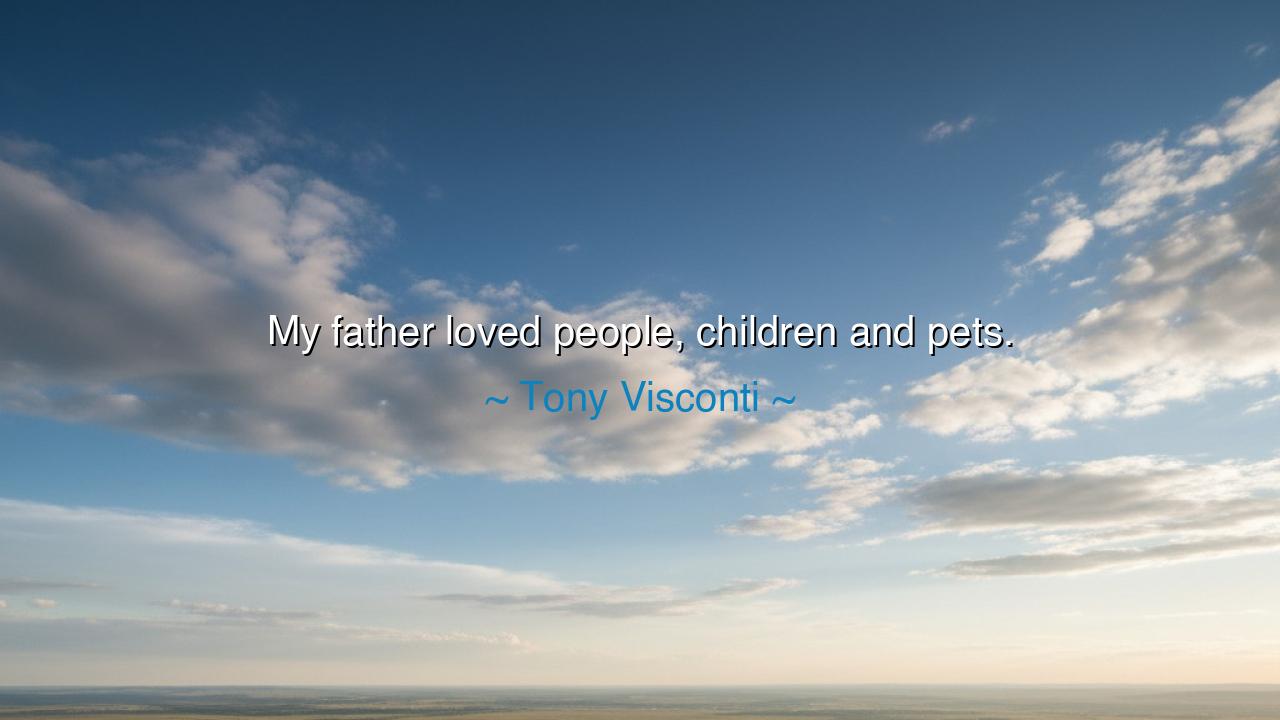
My father loved people, children and pets.






In the words of Tony Visconti, “My father loved people, children and pets.” This simple sentence carries within it a universe of truth — a quiet yet radiant portrait of what it means to be fully human. It is not a grand proclamation of power or intellect, but a humble testament to love — the rarest and most enduring force that binds the world together. In these few words, Visconti honors his father not through achievements or wealth, but through the everyday miracles of affection and kindness. For to love people, children, and pets is to embrace the essence of life itself — the shared breath of all living things, the sacred pulse of connection that runs through creation.
The origin of this quote lies in Visconti’s reflections on his upbringing, his father, and the roots that shaped his spirit. Known as one of the most influential music producers of the modern era — having worked with legends such as David Bowie and T. Rex — Tony Visconti was surrounded by creativity, intellect, and ambition. Yet when he spoke of his father, it was not genius he remembered, but gentleness. His father’s love for all beings revealed a wisdom that transcended talent — the understanding that kindness is the highest form of intelligence, and that love is not something one preaches, but something one practices.
To love people is the beginning of all virtue. It requires patience, empathy, and the ability to see beyond oneself. The ancients taught that humanity’s highest calling was philanthropia — the love of mankind. But to truly love others, one must love without distinction — to see the divine spark in both the stranger and the friend. Visconti’s father embodied this truth, extending warmth to all he met. His love was not selective, but expansive — for those who love widely live deeply, and those who embrace others heal the fractures of the world.
To love children is to love the future, to believe in the continuity of goodness. The child represents innocence, curiosity, and hope — the promise that life will renew itself. A person who loves children cherishes not power, but growth; not control, but nurturing. Consider Nelson Mandela, who after decades of imprisonment, was often photographed surrounded by children, smiling among them as though he drew strength from their laughter. He once said, “There can be no keener revelation of a society’s soul than the way in which it treats its children.” So too did Visconti’s father reveal his soul through such love — not in speeches, but in presence. To love children is to plant seeds of light in soil you may never see bloom, yet trusting that they will.
And to love pets — the silent, trusting creatures of the earth — is to participate in the oldest and purest form of love: companionship unburdened by pride or pretense. The ancients held animals sacred, seeing in them the reflection of the divine order. The Egyptians revered cats for their grace; the Greeks saw dogs as symbols of loyalty. A person who loves animals acknowledges the shared spirit that unites all beings — the breath of life that knows no hierarchy. Such love teaches humility, for animals love without judgment and forgive without measure. To care for them is to remember that gentleness is strength.
Visconti’s words, though small, echo the voices of sages who have taught that love is the foundation of happiness. His father’s legacy is one not of fame or fortune, but of the quiet power of goodness. In a world that often celebrates dominance and brilliance, this quote calls us back to the truth that the highest greatness is compassion. The one who can love fully — across species, generations, and differences — stands closer to the divine than the one who conquers kingdoms or wins applause.
The lesson, then, is both simple and eternal: to live well is to love well. Begin by opening your heart to those around you — to the stranger, the child, the creature at your feet. Let kindness guide your speech and compassion shape your actions. For love, though unseen, leaves the deepest mark; and those who give it freely build monuments not of stone, but of memory.
So, O listener, remember the wisdom carried in Tony Visconti’s tender remembrance: a life is not measured by its fame, but by its affection. Be one who loves as his father did — with open arms, with gentle words, with a heart that recognizes the worth of all living things. For when your days are done, it will not be your triumphs that endure, but the warmth you gave — the kindness that, like sunlight, lingers long after you are gone.






AAdministratorAdministrator
Welcome, honored guests. Please leave a comment, we will respond soon